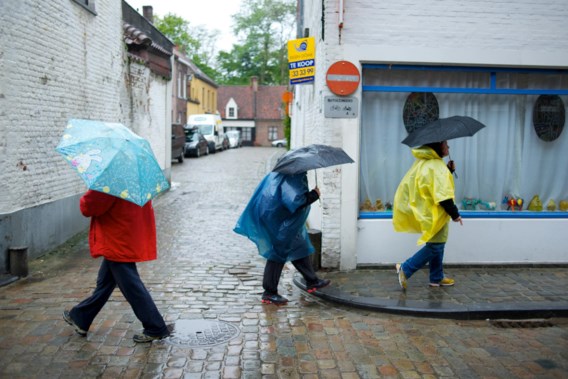First a bad summer, then the wettest winter since 1902, and now a spring that refuses to break through. The April whims are playing tricks on the whole of Belgium. “We abruptly moved from the southern airflow into the northern one. That means rain, hail, low temperatures and even freezing cold at night during the course of next week,” says David Dehenauw of the RMI. The temperature has been six degrees below the normal average for this time of year for a week. “And that after six months of often rain and cold. Next weekend it will finally get a little warmer. But the showers remain.”
This is not exceptional weather. Last year spring was also plagued by rain showers and freezing cold. But it does affect our minds. “We expect spring. The postponed desire for good weather makes us bad-tempered. You want to come outside, have a barbecue, sit on a terrace with friends. And none of that is possible.” Psychiatrist Manuel Morrens of the Duffel University Psychiatric Center sees, in addition to emotional frustration, also a biological cause for the poor weather. “We need sunlight to regulate our hormones. The amount of natural light we absorb, and its intensity, affects our production of melatonin and cortisol. The first influences our biological clock, the second our stress resistance.”
Raw pears
If it stops raining for a while, the sun will come out. But the cold makes us much less likely to go outside to soak up the sun’s rays. “We absorb sunlight indoors – behind a window – much less well,” says Morrens.
It’s not just people who suffer from the cold. “Fortunately, the flowering period is already over, which is when fruit trees are most vulnerable. But if it freezes now, the quality of our pears could still deteriorate,” says Jos Derwael, fruit grower in Heers. The skin of the early fruits reacts to frost and can become rougher and thicker. Not a negligible difference in a large market with a lot of competition. Fortunately, the taste is not affected.
To combat the effects of the cold, Derwael drives around among his trees with a powerful fan and gas burner on the back of his tractor. This spreads warm air through the orchard. He also had special wind turbines installed on his land. These pull the higher and warmer air downwards and blow them between the trees.
It remains to be seen for a while for the cherry harvest. “Some varieties have already stopped blooming and can now withstand a blow. I cannot yet estimate what the consequences of the cold will be for a number of others.”
Eaten daffodils
Amateur gardeners must be patient. “The work is left behind, because it is too cold to root around in the garden,” says Ann Michiels of Tuinrangers, a Flemish initiative in which volunteers provide free gardening advice to residents in 62 municipalities.
Her tulips are already there because of the moisture and rain. Because of all that rain there are also a lot of snails. They have already eaten the daffodils and are now trying to take control of the herb garden. But for Michiels, none of that matters that much. “Otherwise the garden is looking very nice, a little rain and cold can’t hurt. We have to let nature take its course,” says Michiels. “We as people can learn something from that.”


